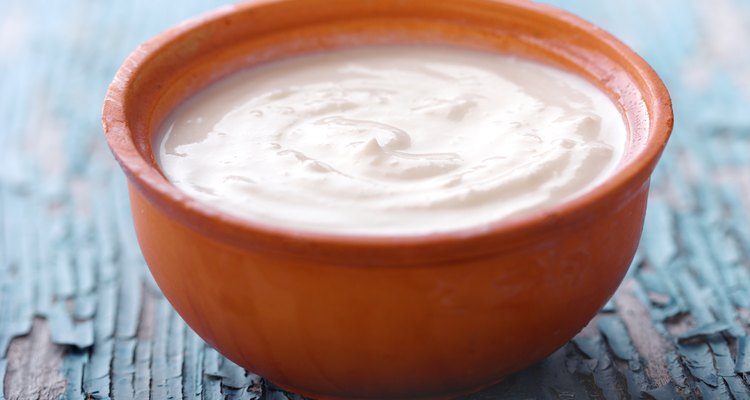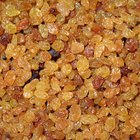
Liv Friis-Larsen/iStock/Getty Images
No matter which style you eat, yogurt is good for you. One 8-ounce serving of yogurt provides 25 percent more calcium than one cup of milk, the potassium content of one banana and the protein you’d get from one egg, along with live bacteria that improve digestion. Whether you prefer the creamy texture of regular yogurt or the thicker consistency of Greek yogurt, each provides a host of benefits.
How Yogurt Is Made
Both Greek and regular yogurt come from pasteurized milk -- whole, low-fat or nonfat -- fermented with Lactobacillus bulgaricus and Streptococcus thermophilus. These two healthy live bacteria cultures break down the milk's natural sugar, better known as lactose, and enable better digestion, especially good for the lactose-intolerant. What gives Greek yogurt its thicker consistency is the extra step of straining out the liquid whey.
Greek Yogurt
Both Greek and regular yogurt are packed with calcium, protein, riboflavin, vitamin B-12, phosphorous and potassium. But Greek yogurt's concentrated preparation gives a slight edge in nutrients, says Julie Kennel Shertzer, a nutritionist at Ohio State University. Compared to regular yogurt, one 8-ounce serving of Greek nonfat yogurt contains more protein and less sodium and, because all lactose goes out with the whey, less sugar and carbohydrates. A better choice if you’re watching sugar and salt intake, Greek yogurt also keeps you stay full for longer, thanks to its thick consistency. Since whole milk Greek yogurt is higher in fat and saturated fat than whole milk regular yogurt, choose the lower-fat varieties for fewer calories.
Regular Yogurt
The straining process for Greek yogurt removes calcium, leaving regular yogurt with about three times as much, or about one-third of the recommended daily amount. An 8-ounce container of regular nonfat yogurt contains 450 milligrams of calcium, compared to 151 milligrams in the same amount of nonfat Greek yogurt, according to “Cooking Light” magazine. The regular nonfat yogurt also contains 127 calories, 13 grams of protein and 175 milligrams of sodium, compared to the Greek nonfat yogurt’s 121 calories, 20 grams of protein and 83 milligrams of sodium.
Additions
Yogurt may also include acidophilus, another bacterium to supplement the intestinal flora, as well as sweeteners, various flavorings, fruit, preserves or a stabilizer. For longer shelf life and a less bitter flavor, cultured yogurt may be heated, but this will kill the beneficial bacteria. Look for the "Live & Active Cultures" seal from the National Yogurt Association to ensure that the yogurt hasn't been heated and that these bacteria remain in your yogurt. Plain versions of either Greek or regular yogurt are healthier than those with added sugars and flavors. You can add your own fruit and sweetener for a healthier version of flavored yogurt.
Related Articles

Facts About Yoplait Yogurt

Difference Between Yogurt & Curd

Dates & Yogurt Diet

What Are Health Benefits of Stinky Tofu?

Why Does Greek Yogurt Have More Protein ...

Can I Substitute Vanilla Yogurt for ...

How Can I Tell If Yogurt Has Curdled?

Whole Milk Vs. Lactaid Milk

Greek Yogurt as a Replacement for Sour ...

How to Freeze Greek Yogurt

The Amount of Lactose in Yogurt

How to Mix Yogurt With Unflavored ...

How to Freeze Tzatziki

Kefir Substitute

What Happens When You Heat Up Greek ...

Is Soy Milk Casein-Free?

What Is Balkan Yogurt?
Nutrition Information for Onken Yogurt

How to Prepare Water Kefir to Drink
How to Save Homemade Yogurt That Didn't ...
References
Writer Bio
Lorraine Shea writes about yoga, fitness, nutrition, healing, philosophy, art, decorating and travel for magazines and websites including Fit Yoga, Pilates Style and Country Accents. She teaches Anusara-style yoga and specializes in breath technique, active relaxation and therapeutics. She has a B.A. in English from New York University.
Photo Credits
Liv Friis-Larsen/iStock/Getty Images